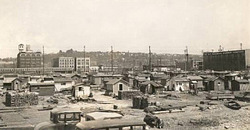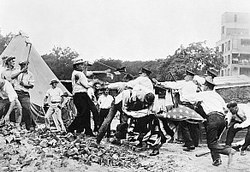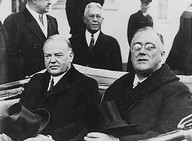|
|
|
Profiles * Political Thought * Colonial Government * Revolution * Constitution * Birth of Party Politics * War of 1812 * James Monroe: "Era of Good Feeling" and Monroe Doctrine * Jacksonian Democracy * Regional Conflict and Compromise * 1860 Election of Abraham Lincoln * Civil War 1861-62 * Civil War 1863-65 * Reconstruction and Impeachment of President Johnson * Gilded Age and Progressive Era * 1912 Election of Woodrow Wilson * 1916 Election and World War I * Women's Suffrage * Depression and 1932 Election of Franklin D. Roosevelt * Prelude to World War II * Pearl Harbor and Mobilization * World War II: European Theater * World War II: Pacific Theater * Atomic Bomb and End of World War II * 1948 Truman-Dewey Election * 1960 Kennedy-Nixon Election * 1964 Johnson-Goldwater Election * Civil Rights Movement * Vietnam: Evolution of the American Role * Vietnam: Kennedy Administration and Intervention * Vietnam: Johnson Administration and Escalation * Vietnam: Nixon, Ford and Fall of South Vietnam * 1968 Humphrey-Nixon Election * Watergate Scandal and Resignation of President Nixon * 1976 Carter-Ford Election * 1980 & 1984 Reagan Elections * Clinton Impeachment * 2000 Bush-Gore Election * War in Iraq * 2008 Obama-McCain Election * 2016 Trump-Clinton Election |
Depression and the New Deal "Hooverville" in Seattle in 1933. Image: Seattle-King County Health Department Photograph Files "Hooverville" in Seattle in 1933. Image: Seattle-King County Health Department Photograph Files
Stock Market Collapse and Hoover Response In a period of ten weeks after the stock market crash on October 24, 1929, stocks on the New York Stock Exchange lost half of their value. As stock prices continued to fall during the early 1930s, banks closed, businesses failed, and unemployment rose sharply, doubling from four million in 1930 to eight million in 1931. By 1932, there were 12 million without jobs--one of every four workers. President Herbert Hoover had taken some steps in an attempt to soften the impact of the economic depression, primarily by increasing federal construction of public works projects and urging state and local governments also to expand their own building programs. The Administration also encouraged voluntary efforts by employers to spread available jobs to more people through shortened workweeks and workdays. Hoover resisted, however, additional spending to create jobs or provide relief for the unemployed which would produce a federal budget deficit, maintaining his belief that the economy would start to improve without the need of major intervention by the government. The President's restraint inevitably led to personal attacks linking him with the cause of distress, such as the so-called "Hoovervilles," the shanty towns set up throughout the country where those who had lost their homes through foreclosure lived in makeshift shelters.  Members of "Bonus Army" and police battle in Washington, DC as police attempt to clear their encampment. Image: National Archives Members of "Bonus Army" and police battle in Washington, DC as police attempt to clear their encampment. Image: National Archives
In 1931, Hoover vetoed a bill providing bonuses for World War I veterans, rejecting the contention that the bill would help stimulate spending and strengthen the economy. In 1932, thousands of veterans traveled to Washington as the "Bonus Expeditionary Force" or "Bonus Army" to lobby unsuccessfully for Congressional passage of a new bonus bill; even after the bill was defeated in the Senate on June 17, they stayed for weeks longer in makeshift tent camps until troops under the command of General Douglas MacArthur were called out on July 28 to clear the streets. MacArthur apparently ignored orders from Hoover not to pursue the protestors to their main camp across the river from downtown Washington, which was destroyed by a fire of uncertain origin, but MacArthur's praise of Hoover for his action placed responsibility on the President for the unpopular move just as his 1932 re-election campaign began.
....We can not further the restoration of prosperity by borrowing from some of our people, pledging the credit of all of the people, to loan to some of our people who are not in need of the money. If the exercise of these rights were limited to expenditure upon necessities only, there would be no stimulation to business. The theory of stimulation is based upon the anticipation of wasteful expenditure. It can be of no assistance in the return of real prosperity. If this argument of proponents is correct, we should make Government loans to the whole people. . . President Herbert Hoover's veto message of February 26, 1931, to House of Representatives returning Bonus Bill without approval Miller Center, University of Virginia See also "The March of the Bonus Army" (video), PBS Roosevelt Campaign Serving his second term as governor of New York, Franklin Delano Roosevelt had gained the Democratic nomination for president with considerable difficulty. Within his own state, many Democrats still backed Al Smith, the party's nominee in 1928 who had lost to Hoover and was again seeking the nomination in 1932. Like Smith, Roosevelt's other competitors for the nomination primarily shared Hoover's opposition to government intervention to revive the economy. Taking a different course as governor, Roosevelt had been the nation’s first governor to combat the Depression through public programs, calling the state legislature into special session in 1931 to pass an emergency appropriation to provide relief to the unemployed and hiking state income taxes to finance the costs. In the spring of 1932, Roosevelt attacked Hoover's policies in a national radio broadcast, saying, “These unhappy times call for plans that put their faith in the forgotten man at the bottom of the economic pyramid.” At the Democratic National Convention in Chicago, on the first two ballots Roosevelt fell short of securing the two-thirds majority needed for the nomination in marathon voting sessions that ran through the night past dawn of the following day. On the third ballot, however, House Speaker John Nance Garner, who was in third place behind Roosevelt and Smith, decided to withdraw as part of a deal for his nomination for vice president, freeing enough delegates to give Roosevelt the presidential nomination. Once nominated, Roosevelt broke precedent by appearing personally to accept the nomination and address the delegates, promising that he would offer a "New Deal" (adapted from his cousin Theodore Roosevelt's "square deal"). ....Our Republican leaders tell us economic laws--sacred, inviolable, unchangeable--cause panics which no one could prevent. But while they prate of economic laws, men and women are starving. We must lay hold of the fact that economic laws are not made by nature. They are made by human beings....I pledge you, I pledge myself, to a new deal for the American people. Let us all here assembled constitute ourselves prophets of a new order of competence and of courage. This is more than a political campaign; it is a call to arms. Give me your help, not to win votes alone, but to win in this crusade to restore America to its own people... Franklin D. Roosevelt acceptance speech for Democratic nomination, July 2, 1932, American Presidency Project, University of California at Santa Barbara Roosevelt's campaign also departed from tradition in communicating its message by making the candidate freely accessible to the press, even adding a special press car to its campaign train. The campaign also was the first to make extensive use of radio broadcasts, exploiting Roosevelt's reassuring voice and confident delivery that would later be effectively used during his Administration. The positive relationships with the media cultivated by Roosevelt also may have contributed to the unspoken policy in which journalists avoided references to or publishing photographs of his paralysis from the effects of polio he had contracted in 1921 at the age of 39. Election of 1932 and Roosevelt Inauguration
Roosevelt defeated Hoover by seven million votes, taking over 57% of the popular vote and receiving 472 votes to 59 votes for Hoover in the Electoral College. After Roosevelt's overwhelming election, a rather contentious relationship developed between the president-elect and the outgoing Hoover administration. Despite the repudiation by the voters, Hoover continued to follow his cautious fiscal policy in the months of the protracted transition period from November to March until the new president was inaugurated. The delay in the transfer of power also led to calls for a shorter transition, which would ultimately lead to the approval of the 20th Amendment to the Constitution changing the inaugural date to January 20 following the presidential election.
|
